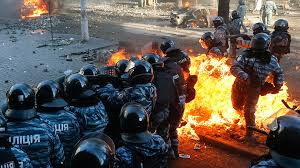The main crisis of human rights is not about perceptions, but about its complicity with domination.
When Israel is criticized about its rights-abusive policies in the West Bank and Gaza Strip, the refrain most often heard among local politicians is that the government’s hasbara–the Israeli propaganda machine–is inadequate. The problem, in other words, is not what Israel actually does to the Palestinians, but rather the inability to get its positive message across to the international community. This is usually referred to as “rebranding Israel“. The underlying assumption here is that the merchandise is fine, and only the packaging needs to be replaced.
Rachel Krys’ recent argument about the crisis of human rights is based on a similar logic, even though she is writing about a different issue. She tells us that most people in the UK do not support human rights, while arguing that this is happening because human rights are presented in a way that is disconnected from people’s everyday lives. She claims that if the public would hear less “negative discourse” about human rights and more “stories about old people challenging bad treatment, invasive decisions or the intrusion into their private and family life”, support for human rights would be much wider. Once again the problem with human rights has to do with perceptions, and the solution, here as well, is hasbara.
The relationship between representation and reality is, however, much more complex. It has to do with human rights themselves: the way they have been institutionalized, the political projects to which they lend themselves, their intricate connections to the state, and the alternative discourses of justice they omit and repress.
We do not assume, as many human rights practitioners and scholars do, that more human rights necessarily lead to more emancipation. Indeed, the assumption that people would believe in human rights if only they better understood human rights work is misguided. Human rights can, and often do, enhance domination. This issue becomes particularly urgent when NGOs that purport to criticize abuse align themselves with the very powers they investigate and criticize.
Consider a 2013 report on drone attacks in which Human Rights Watch (HRW) examines six unacknowledged US military attacks against alleged Al-Qaeda members in Yemen. Eighty-two people, of whom at least 57 civilians, were killed in these attacks. Yet this is a mere sample of the 81 attacks carried out in Yemen, and it does not include the hundreds of targeted killings in Pakistan and Somalia.
HRW argues that two of the six attacks were in clear violation of international humanitarian law because they only struck civilians, or they used indiscriminate weapons. HRW also states that:
“The other four cases may have violated the laws of war because the individual attacked was not a lawful military target or the attack caused disproportionate civilian harm, determinations that require further investigation. In several of these cases the US military also did not take all feasible precautions to minimize harm to civilians, as the laws of war require.”

